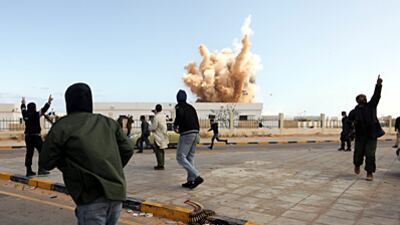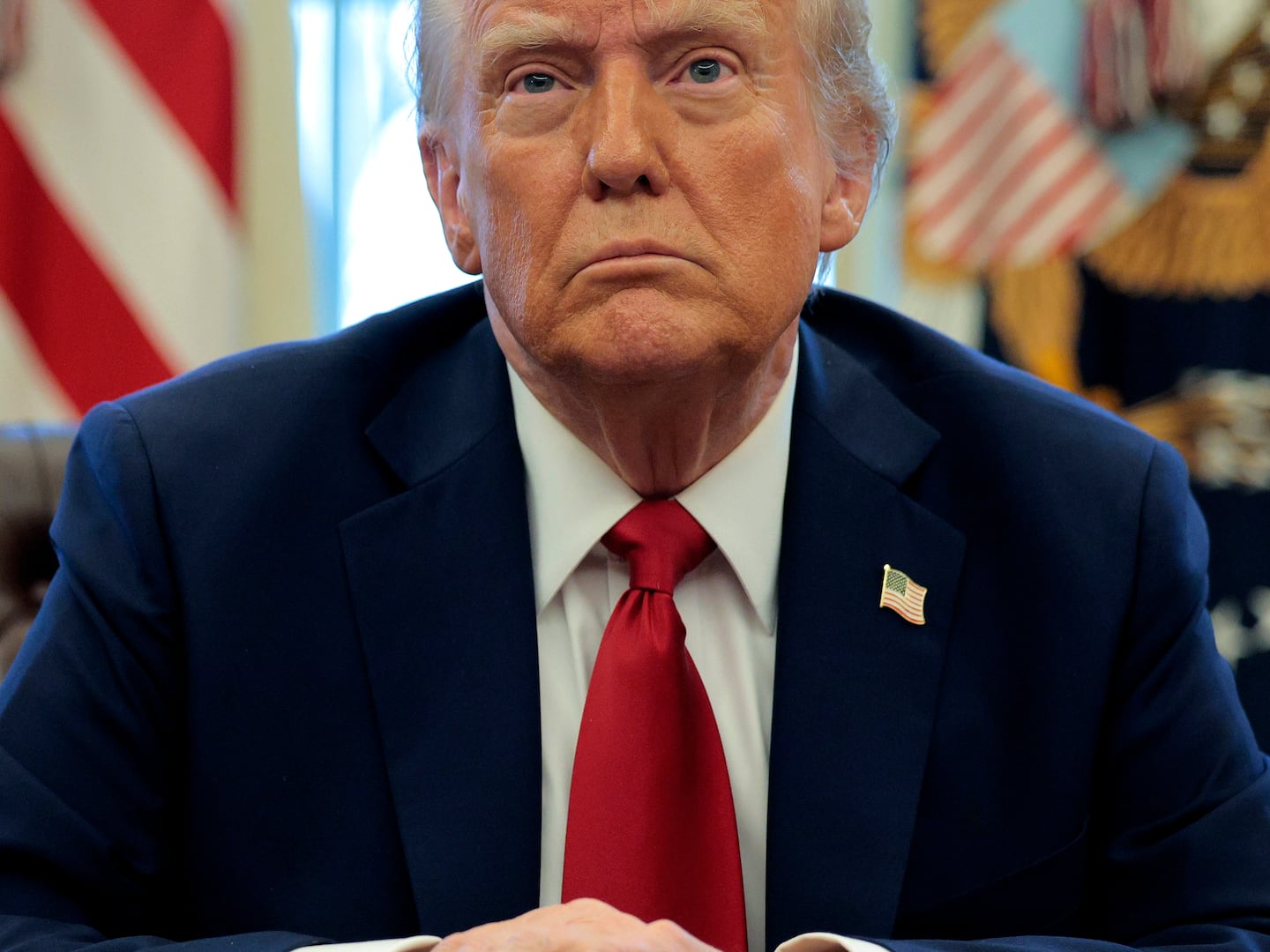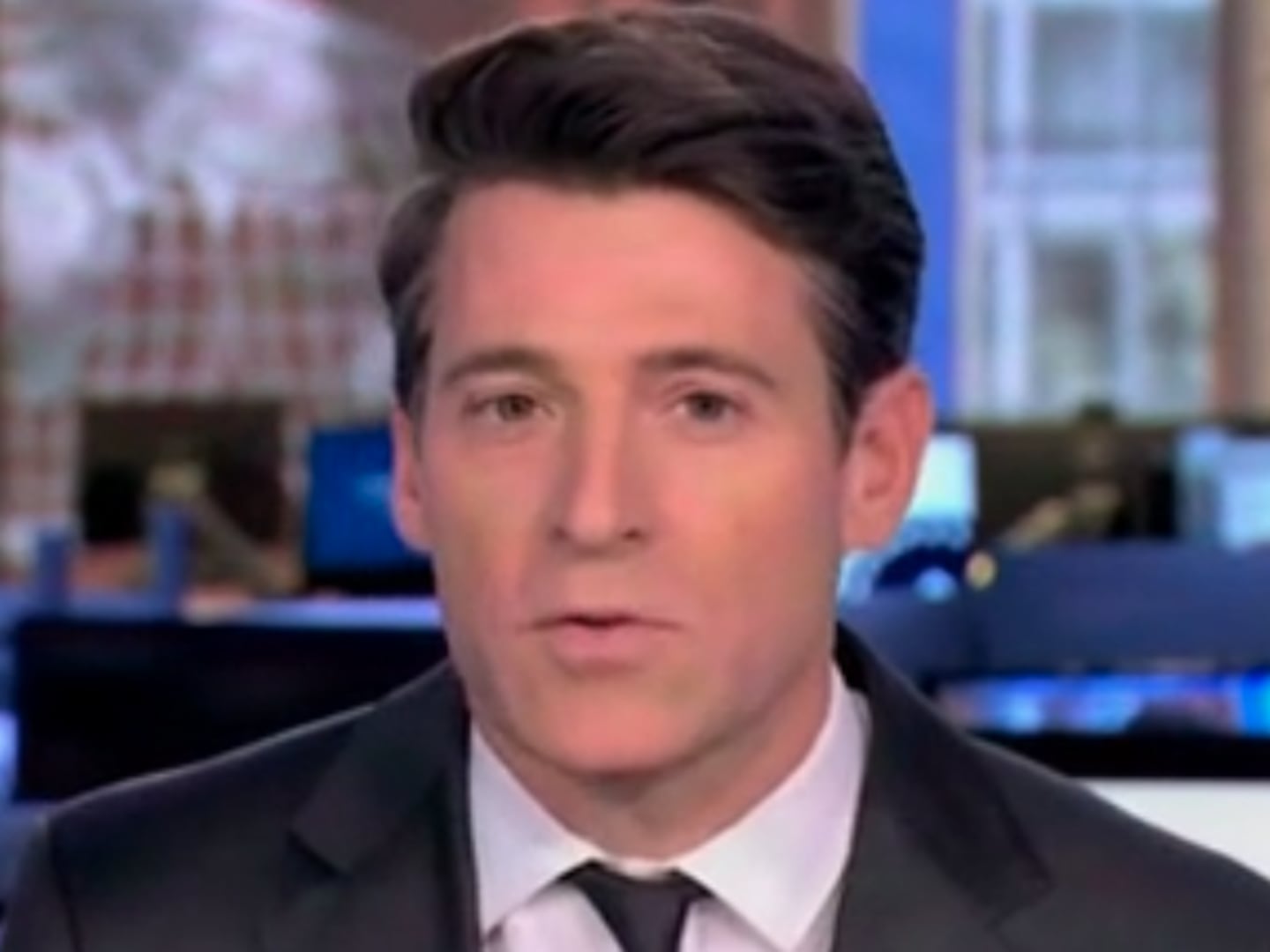As pro-Gaddafi forces launch a massive counterattack against the opposition Tuesday, President Barack Obama spoke with British Prime Minister David Cameron Tuesday afternoon and affirmed that the 41-year ruler must leave "as quickly as possible." The White House said that the two also agreed that a full range of possible responses, from an embargo to military intervention, remain on the table despite U.S. reluctance thus far—turning the heat up on Gaddafi. Meanwhile, Gaddafi loyalists are using air strikes, tanks, and cannon against rebels.
Christopher Dickey on the West's cowardly response—and why a no-fly zone is a must. Plus, read our cheat sheet of the arguments for and against U.S. intervention.
President Barack Obama and European heads of state are enthralled spectators to events on the ground in Libya, waiting and watching for the first real massacre. Once that happens—once they allow that to happen, standing by as Muammar Gaddafi loyalists with air power and tanks slaughter scores of civilians—then Western leaders may actually feel they have enough political cover to get involved. Actually, it would be better from the Obama-Cameron-Sarkozy point of view if hundreds of civilians get killed. Anything less, it would seem, and it’s a no-go even for a no-fly zone.

That is what British Foreign Minister William Hague is saying when he talks about “ a clear trigger” and “a demonstrable need that the whole world can see” before a no-fly option can be hammered through the U.N. Security Council. That’s what President Obama had in mind when he warned Gaddafi on March 3 that “ those who perpetrate violence against the Libyan people will be held accountable.” He was talking, you will note, about retribution after the fact.
The American military, meanwhile, is so damn tremulous at the prospect of a military engagement in Libya that Gen. David Petraeus and Defense Secretary Robert Gates were caught by an open mic on Monday making an ironic joke when Gates landed in Afghanistan:
“Flying a little bigger plane than normal,” said Petraeus. “ You gonna launch some attacks in Libya or something?”
“Heh-heh, yeah,” Gates chuckled. “Exactly.” Nothing could be farther from his intentions.
Given all the lessons learned far too late in Afghanistan and Iraq since 2003, one can understand the reticence of the uniformed services. But, in fact, the explanations given for caution about imposing a no-fly zone in this case are mistaken, if not willfully misleading, on just about every count. When I read a blind quote from a White House staffer in Tuesday morning’s New York Times saying Obama “ keeps reminding us that the best revolutions are completely organic,” I tried to convince myself our learned head of state is not, in fact, such a fool as his staffer. Organic? Meaning totally home-grown and self-sustaining? Ask the French, for instance, how “organic” the American Revolution really was.
If we Westerners are worried about popular sentiment in the Arab world, which would be something novel for us, then the opinion we need to satisfy should be that of the young people in the streets who have risen against their dictators. They represent, after all, some two-thirds of the region’s population.
“We’ll be watching carefully to make sure we’re on the right side of history,” Obama told us last week. But then he equivocated, as usual, saying the U.S had to take “all the various equities into account.” Those are not exactly inspiring words to protesters in Libya literally begging for international protection from Gaddafi’s air force. " We don't want a foreign military intervention, but we do want a no-fly zone," as one rebel fighter told the Associated Press. "We are all waiting for one.'' The rebels can take on “the rockets and the tanks,” he said, “but not Gaddafi's air force.” The longer the West wrings its hands while the Libyan protesters-turned-rebels twist in the wind, the more the West will be resented, not applauded.
One thing the uprisings in Tunisia and Egypt have taught us is that conventional wisdom about Arab thinking often sounds like irrelevant nonsense to the young people who are driving this epochal change in the region. So it is simply stunning to hear Washington and the Europeans fretting they’ll be accused of a plot to re-colonize Libya. In fact, it’s their client Gaddafi who’s making that claim—when he’s not insisting the whole uprising is directed by al Qaeda. Or perhaps we’re all in cahoots? The only real reason for Washington, London, Paris, and Rome to pay attention to this line is because it’s a convenient excuse to do nothing.
The longer the West wrings its hands while the Libyan protesters-turned-rebels twist in the wind, the more the West will be resented, not applauded.
By buying into Gaddafi’s rhetoric, in fact, the West risks inspiring another convoluted conspiracy theory among the kids of the New Middle East: one in which the Americans and their allies are plotting to preserve the mad tyrant with whom they have cut so many profitable deals over the last decade. After all, Gaddafi has assured a good supply of oil and gas, and with sweetheart contracts that gave foreigners an equity stake in Libya’s oil reserves. He has attacked America’s enemies linked to al Qaeda. He has poured money into Western banks and even universities. Why wouldn’t Gaddafi continue to do those things in the future once he’s eliminated his opposition? Could the West rely on the more or less faceless Libyan opposition, a rabble in arms, to be so pliable? Maybe, for all their denunciations of Gaddafi, Obama and his buddies in the trans-Atlantic alliance would really rather deal with the devil they know…
Conspiracy theories aside, the salient lessons here should be taken from Iraq in 1991, not 2003. The Shiites in the south of the country have never stopped hating the United States—to this day—for applauding their uprising then failing to protect them from Saddam Hussein's ferocious counterattacks with helicopters and tanks. The Kurds in the north—who were given logistical support by American troops on the ground and were protected by American, British, and French air cover—have never stopped thanking the West for helping them secure their homeland.
Peter Galbraith, who was in Kurdish Iraq during Saddam’s 1991 offensive, then served as ambassador in Croatia when no-fly zones were imposed during the Balkan wars, has about as much experience as anyone with the practical implications. Imposing one in Libya “isn’t by itself going to protect the civilian population,” he told me on the phone a few days go. The real fighting will still have to be done by Libyans. “But it sends a signal, and takes a tool out of Gaddafi’s toolbox,” said Galbraith. “It may, as in Kurdistan, have a psychological effect on the Libyan military and encourage more defections, signify that Gaddafi is on a slippery slope, and make them question whether they should be loyal, especially if they are going to be held to account.”
At the risk of redundancy, let’s be clear that a no-fly zone is not an “invasion” and much less an “occupation” of Arab land. Those are fighting words for any people who have ever felt the grinding boot of colonialism on the back of their neck. And trying to gloss over that fact by calling an occupation "liberation" doesn't cut it, as George W. Bush and supporters of the 2003 war should have learned. One hopes that is what Defense Secretary Robert Gates meant when he said anyone inclined to send a land army into the Middle East or Africa would have to “have his head examined.” But that is not, in fact, what we're talking about.
One could argue that a no-fly zone is not even an act of war. When Gates claims, as he did on Capitol Hill the other day, that the only way to conduct such an operation is to take out all of Libya’s anti-aircraft installations first, he's once again ignoring the history of Iraq in the 1990s. Then, most of Saddam's air defenses were operational, Saddam just wasn't allowed to turn on their targeting radars. Whenever an Iraqi AA crew did dare to "light-up" the aircraft patrolling the no-fly zone, the allies took the installations out in a matter of seconds. That's what technological superiority is all about. The American taxpayer pays half a trillion dollars a year to make sure we’ve got it. If we don’t have enough of an edge to bluff and baffle Gaddafi’s antiquated and ill-maintained air defenses, we really are in trouble.
Another of the Libyan tyrant’s charges, which the Americans and Europeans seem to think they have to worry about, is that they are after Libya’s oil and gas.
Well, of course they are! And the rebels and Gaddafi are building their whole strategy around that fact. Who controls the flow of Libya’s black gold and blue flames controls the money and the country. The embattled towns you keep reading about in the headlines, like Zawiya to the west of Tripoli and Ras Lanuf to the east, are major links in oil and gas networks. The extent to which those facilities have been left unscathed by the current fighting is an indication of just how important they are. Both sides want them to continue functioning, but in their own interest. One vital purpose of a no-fly zone would be to prevent Gaddafi loyalists from bombing the oil ports as a parting shot if they lose control of those cities completely. If Gaddafi can take them and hold them then some voices in the West—especially in Italy, which is highly dependent on Libyan gas and oil—will start talking “let’s make a deal.”
So, let’s take a closer look at those “equities,” as Obama called them. He wants to show that the United States can work with the international community to resolve this crisis. OK. Some pieces have fallen into line. Leaders of the Arab Gulf states, for instance, want to throw their weight against Gaddafi. (Mad Mo once plotted to have Saudi King Abdullah murdered by rocket-propelled grenade in revenge for an insult at an Arab summit, so there’s some bad blood there.) If the Arab League comes on board, that’s good, too. African leaders who have long been on Gaddafi’s gift list may be more skittish. The Russians and the Chinese are always leery about such interventions. NATO is saying hell, no, it won’t go unless the U.N. signs on. And Hague and the British say all that has to happen before anything substantial can be done at all.
That’s why, although they’re not using the word, Western leaders are praying for a massacre. The simple and obvious fact is that without it they don’t have enough guts, or even enough good sense, to act.
Christopher Dickey is a columnist for The Daily Beast and Newsweek magazine's Paris bureau chief and Middle East editor. He is the author of six books, including Summer of Deliverance, and most recently Securing the City: Inside America's Best Counterterror Force—the NYPD.






